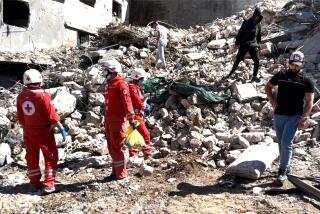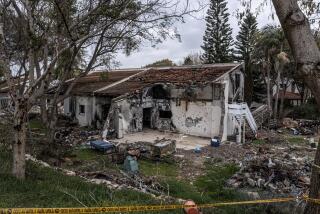The Bitter Land
- Share via
One week after the event, Israeli officials are still trying to piece together the full story of how two young Arab men and a 15-year-old Israeli girl came to be killed in the Arab village of Beita on the occupied West Bank. Forensic evidence has allowed military investigators to establish a few key facts. Chief among these, as the Israeli cabinet was told this week, is that Tirza Porat, the Israeli fatality, died from a bullet through the head fired from an M-16 rifle carried by one of the guards who accompanied her and other children on a hike. This finding dramatically contradicts the initial and emotionally explosive claim that the girl had been stoned to death by Arab villagers. For that reason it has incensed Israeli right-wingers.
The basis for their wrath is clear. The continuing army investigation, rather than laying blame for the tragedy wholly on the 3,000 residents of Beita, increasingly hints at some degree of shared responsibility for what took place. That responsibility does not, of course, fall on the 16 Israeli children who had been taken on a holiday walk without, it is now known, getting required army permission for the excursion. Rather it rests on one of the two armed adults who accompanied and who were supposed to protect the young hikers. The guard who was armed with the M-16, a 26-year-old man named Romam Aldubi, has been identified as a violence-prone extremist who was banned by the army from the West Bank town of Nablus last year because of repeated instances of provocative behavior. Could Aldubi have deliberately gone looking for trouble in or near Beita, with tragic results? The military investigation strongly encourages such an inference.
Ultra-nationalist Israeli settlers and their political allies of course want to hear none of this. They prefer to keep explanations for troubles anywhere in the occupied territories simple--they are always the Arabs’ fault--while fanning emotions to a feverish intensity. Now the army, which has always tried to remain aloof from domestic political battles, sees its apparent effort to conduct an impartial investigation at Beita bringing it under right-wing attack. The army commands more respect from more Israelis than any other institution. Should it be dragged into partisan controversy the political price Israel is already paying for its increasingly burdensome occupation of the West Bank can be expected to go up markedly.
More to Read
Sign up for Essential California
The most important California stories and recommendations in your inbox every morning.
You may occasionally receive promotional content from the Los Angeles Times.













